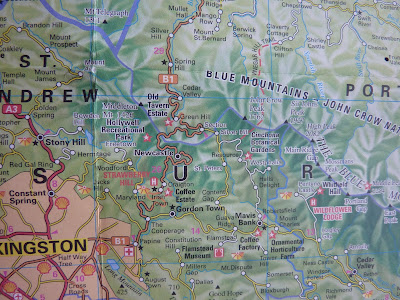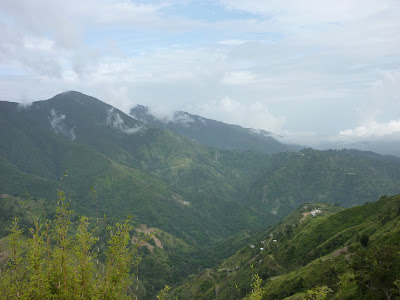 The biggest land crab awaits his fate in my bathtub
The biggest land crab awaits his fate in my bathtub
I have many fond memories crab memories from the jersy shore (as we Philadelphians would say "Down the shore"): cleaning crabs with my grandmother, being yelled at by my Italian great-grandfather Pop-pop "Don't touch-a my crab-a traps!", and sitting with my family picking through crab after crab as the sunset over the bay and the atlantic city skyline lit up the night sky.
On Friday night while leaving a reggae concert on beach road, I saw "wan 'ole 'eap a crab" scurrying up and down the shoulder. These aren't Maryland Blue crabs; they're LAND CRABS. With reggae beats still in my head I started planning an epic hunt. I started asking around about these dinosaurs, finding out everything I needed to know and gaining the advantage on my opponent. You don't catch these crabs with traps because they don't live in the sea. They live in holes on land. They're big. They're ugly. They're dirty, and they're smart. They come out of their holes at night to feed, but usually don't venture very far. As soon as they know you're coming they duck back down into their holes. Land crabs have keen hearing and eyesight so they are a challenege to sneak up on. The best time to catch them is after a heavy rain; their holes flood so all the land crabs come out to breathe.
 Bigga hunting crabs with his light and stick
Bigga hunting crabs with his light and stickIt poured on Saturday night. Soooo...Sunday night was crab night! I called a fellow PCV, Bart to see if he wanted to come crab hunting. Apparently I had done my research well because his landlord Bigga and some other neighbors already had plans to look for crabs in the hills. I was welcome to tag along. We were dropped off by Patrick, a local taxi driver on a random residential street where Bigga had seen crabs before. We turned on our torches (or flashlights) and started sweeping the bushes for beady little land crab eyes. The suspense was quickly lost as we didn't see a singal crab on that street. "It's close to the end of the season" Bigga lamented. We had more luck on the golf course although the two crabs I managed to catch were "wash bawn" meaning they were female and pregnant. The crabs carry their eggs on the outside. Pregnant crabs act strangely. They either don't move at all or they go far from their holes very fast. They are often the ones that get run over by cars as they try to cross the street. They are also the easiest to catch. I was plesantly surprised that my crabbing companions didn't keep the wash bun crabs. Most people I've talked seem to focus more on the immediate rewards (one more fish in my pot) instead of preservation for the future (leave the fish to grow and reproduce).
 A "wash bawn" (pregnant) landcrab
A "wash bawn" (pregnant) landcrabBigga and his friend Bobby seemed to have super human senses. They knew exactly where the crabs were and what they were thinking. They did most of the catching and in the end they had a bag full of about a dozen crabs. Beach road, I thought, tomorrow I'm trying my luck on beach road. I had watched the experts: step on the front of the crab so he can't get you, grab it by the back, then drop it in the bag.
It rained again on Monday afternoon and cleared up just before I left the office. Another perfect land crab night. Bart came over and we armed ourselves with his head lamp and a purple bucket with lid to carry the crabs. I changed into sneakers and we left the house just after dark.
As usual, we got a lot of attention as white people walking down the street. Especially white people walking with a purple bucket and headlamp. "What are you looking for, a taxi?" "No sir!" "Oh, you're looking for crabs" Our new machete-weilding friend in a white t-shirt full of holes made his way towards us. "Lend me your light" he said as he grabbed the head lamp from my hand. I feebly held onto the elastic "No man, we naa need yuh help. We want fi catch crabs ourselves." But my protests were to no avail. He had the light and was on a mission, stabbing crab holes (and sometimes crabs) with his machete. He wouldn't give back the light, so my only option was to follow and grab the crabs after he trapped them with his machete. The rain had brought the crabs out, and after only a few minutes, we had a full bucket. As we said goodbye, the man asked for J$200 as a "tip" for his help. "We never even wanted your help - you took our light!" We didn't have any money, so he insisted we give him the crabs because we "never would have caught them without him." He continued down the road swinging his bucket of crabs cursing loudly to himself "raas, bomba clot, $200"
Back to square one! With a slightly bitter feeling, and realizing we had just scared most of the crabs back into their holes, we set out looking again. Every few feet we were approached by people giving us recipes, wanting to help catch them, and asking lots of questions. Who are we? Where do we come from? Why are we doing something so "local?" We managed to catch two crabs, despite all the attention, and turned back towards home. "I want to catch one more crab on the way back." I said.

Bart looking for crabs
We made friends with Minot who runs a
Ital tea stand on the side of the road when he witnessed a crab grab my toe! Luckily Bart could pry it off but I was very glad I wore sneakers! Minot gave me some aloe to soothe my mosquito bites I had inevitably collected by walking through the brush in shorts. He had us try an herbal remedy he made to cure stomach aches and gave me a couple types of grasses to make tea with at home. His generosity and good natured spirit more than made up for our other encounter.
We reached the beginning of beach road, but the only crabs we saw were wash bawn. Through the trees I saw the sweep of flashlights. "How many yuh catch?" I shouted. The proud crabbers opened their bags to reveal about 8 BIG crabs. "Do you want one?" They fished out the biggest one and dropped him into our bucket. "Good luck!" I was satisfied: I had found my third crab on the way home after all.
 A whole bag of crab!
A whole bag of crab!That night I hardly slept at all. I kept waking up thinking that the crabs had knocked the bucket over and were running loose in my apartment. Around 2 in the morning they starting scratching around at the bucket. After an hour or so I got so frustrated I put them outside. Who cares if Lucky finds them: I need to sleep. I woke again at 5AM to Lucky barking. Oh no! The crabs! I run outside to see Sandy's face pressed against her screen. The bucket is still standing but Lucky has discovered it. He sniffs at the bucket, but when the crabs start to move he runs away barking. When he almost knocks the bucket over I decide they need to come back inside.
I told the women at the soup kitchen my crabbing adventure and asked them how to cook the crab. Most people either boil them with salt and
scotch bonnet or they pick out all the meat and curry them. I didn't have any curry powder and I don't like cleaning crabs while I eat them. So, I decided to cook them like my grandmother cooks Maryland blue crabs: clean them, then sautee them with onions, white wine, and lots of old bay. Two problems: 1) There is no old bay in Jamaica and 2) There was no visible way to pry off the backs like there is with Maryland crabs. The first problem was easily fixed by substituting jerk seasoning (while a little sweeter they smell remarkably similar). I fixed the second problem by boiling the crabs first with the salt and pepper like the soup kitchen ladies prescribed. They were fighters: I had to use my machete to get them into the pot.
 Land crabs in my pot
Land crabs in my potAs they boiled a greenish brown scum accumulated on the surface of the water. That can't be healthy. I made sure to scrub all the crabs really well after boiling them to get off the dirt that had accumulated over their lives: again something I hadn't encountered with ocean crabs.
 Post-boiling the crabbies hang out in my sink
Post-boiling the crabbies hang out in my sinkWhen they were nice and clean, I cooked them so my family would be proud. They tasted good, but the meat wasn't quite as sweet as the crabs back home. Afterwards, I felt vaguely sick to my stomach. I couldn't tell if I was actually sick or if that was just the feeling that comes from catching strange creatures in a strange land and cooking them yourself. Sandy's sons caught crabs when she lived in the Virgin Islands. She said they kept them for about two weeks feeding them cornmeal to clean their system and coconut to sweeten the meat. Next time, I might try that although I don't know if I would want to keep the beasts for two weeks. All in all it was another great adventure.
 Nice and clean and ready to eat
Nice and clean and ready to eat
 Community members repair the road with tires and stones. They've already repaired this road once before in this way only to have it wash out again.
Community members repair the road with tires and stones. They've already repaired this road once before in this way only to have it wash out again.
 Lorna, who lives in Westphalia walked down to Mavis Bank, filled her backpack with Ackee, and was hopefully trying to hitch a ride back up.
Lorna, who lives in Westphalia walked down to Mavis Bank, filled her backpack with Ackee, and was hopefully trying to hitch a ride back up.



























 Catch 22
Catch 22 A Walk in the Woods
A Walk in the Woods You Can Farm: The Entrepreneur's Guide to Start and Succeed in a Farming Enterprise
You Can Farm: The Entrepreneur's Guide to Start and Succeed in a Farming Enterprise